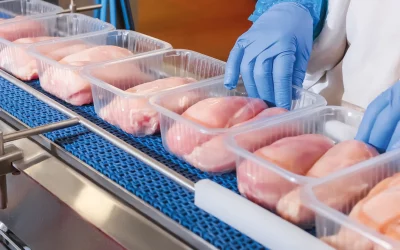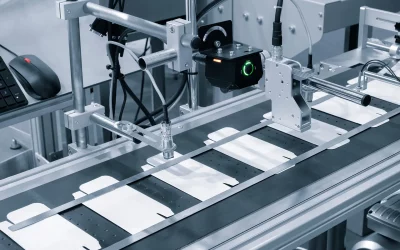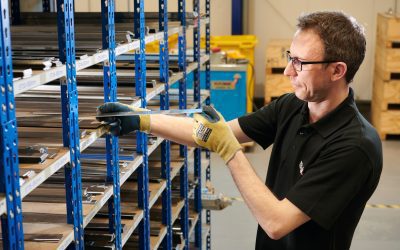Why industrial blades are an important part of meat processing operations
As a £9bn industry employing over 24,000 people, meat processing is big business in the UK.
It’s an industry which is facing a mix of challenges over the years ahead, which makes highly-efficient operations, with minimal downtime, more significant than ever.
Consider the following stats from the Agriculture and Horticulture Development Board:
- Beef production is expected to increase by 2% this year, due to higher than expected cow throughput.
- However, beef consumption is expected to reduce by 4% in response to increases in inflation.
- But, beef exports from the UK are expected to increase as international markets experience spikes in demand coupled with lower internal production.
That last point is a particularly critical one. Ever since China lifted its ban on red meat imports from the UK in April 2018, international demand for British beef has increased considerably.
This means that there are significant growth opportunities for meat processors that are able to meet demand and quickly and efficiently process meats for both domestic consumption and international export.
The challenges facing the meat processing industry
Despite the rather rosy picture outlined above, there are nevertheless a number of challenges facing UK meat processors. We’ve detailed these challenges below.
Increased costs
As the UK economy expects to see 11% inflation by the end of this year, meat processors are going to have to deal with increased cost pressures.
Increased costs are expected in many forms, including higher deadweight cow prices (hitting 442p/kg in June – up 50% year-on-year!), as well as higher energy costs and costs of production.
As such, meat processors can reap significant savings by investing in high-quality industrial blades with longer lifespans.
Labour shortages
As with many other industries in the UK, the meat processing industry is facing significant labour shortages.
With it being difficult to recruit and retain top talent, meat processors are increasingly looking to invest in plant and machinery that can be automated to a greater extent than previously.
Naturally, such investment in advanced plant should also be matched with investment in the very best industrial blades, which can reduce blade-related downtime.
Changing consumer habits
Today’s consumers are no longer content with traditional meat cuts. Instead, a new, younger generation of consumers has emerged that wants high-protein, low-calorie meat products.
This poses a challenge to meat processors as they may need to retool, or at least select different – more appropriate – industrial blades to deliver the kinds of cuts required by these ‘new generation’ meat products.
The best industrial blades for meat processing operations
With those points in mind, meat processors are in a good position, with plenty of opportunities for increased revenues and profit margins – provided they are using the correct industrial blades in their plant and machinery.
So, what are these blades? Let’s take a look…
Cutoff blades
Cutoff blades are a highly-flexible addition to meat processing operations, being suitable for a range of butchering applications.
The best cutoff blades are manufactured from top-grade stainless steel and are highly polished to a finish which reduces friction and the opportunities for corrosion to develop.
Here at MRMK, we are able to design and manufacture custom cutoff blades of different materials and edge configurations.
Slaughtering saws
A slaughtering saw, also typically known as a brisket saw, is used to cut the anterior chest bones of cattle. As such, you require a slaughtering saw to be made of a tough, durable material such as stainless steel.
It’s also important that you select a slaughtering saw that is not going to dull quickly, considering the amount of wear that is associated with cutting through anterior bones.
Slaughtering saws are typically considered to be sawing blades rather than slicing blades, as they will remove some material as they cut. As such, they are typically used for carcass splitting and bone-in meat cutting operations.
Bandsaws
Bandsaws are used widely throughout the meat processing industry, given that this type of blade can create accurate cuts with little input force.
When selecting a bandsaw for your meat processing machinery, you should give careful consideration to the teeth on the blade. Whilst it’s possible to buy bandsaws with teeth that allow for both forward and reverse movements, these can pick up sinews and fibres that lead to clogging.
Likewise, if you’re cutting meats of different thicknesses, then you’ll have to think about bandsaw blades that can cut at different speeds.
If you’re going to be using bandsaw blades to cut through meat with bones, then you’ll need to select a blade with an aggressive edge. On the other hand, if you’re going to be using your bandsaw blades to cut through boneless meats like chicken, deli meats etc, then choose a blade with a scalloped edge.
Here at MRMK, our bandsaw blades are compatible with any machine, are super sharp, deliver a super yield and are available in heights from 10 mm to 100 mm.
Dicing blades
Dicing blades (which are sometimes also known as grid blades), are used to create cubed portions of meat.
These blades are an essential part of many meat processing operations, and play an important role in transforming a carcass into a range of cuts.
As some dicing machines can cut between 500 and 800 times per minute, it’s vital that the dicing blades you select are razor sharp and made from the highest-grade stainless steel. Failure to select dicing blades with these characteristics is almost certainly going to result in unwanted machine downtime.
Injector needles
Injector needles are typically used in meat processing operations to impregnate meat with extra moisture or flavours. Injectors can also be used to inject sauces and marinades directly into the centre of a cut of meat.
If you intend to use injector needles in your meat processing operations, then you’re going to need to think about several things, including; sauce/liquid thickness, the thickness of the meat being injected, if the sauce contains chunks of garlic or herbs, whether the meat has bones and more.
All of these factors will influence the type, size, and gauge of injector needles you select for your processing machinery.
Here at MRMK, all of our injector needles are available in a huge range of sizes and diameters and are made from food-safe, antibacterial, top-grade stainless steel.
Tenderisers
Tenderisers are used to even out and break down tough sections of meat, to create a consistent piece of meat.
Tenderisers are also useful in taking poorer quality cuts of meat and processing them, so they can be used for alternative applications.
Industrial meat tenderisers tend to be available in manual, semi-auto, and automatic versions, so bear this in mind when selecting blades for your machinery.
Mincer knives
When it comes to creating the best possible mince, top-quality mincer knives are essential.
Mincer knives (also known as hole plates) must retain their sharpness for long periods. If you use a mincer knife which has become blunt, you’ll find that it no longer offers a tight cutting action, resulting in a ‘mushy’ minced product. As you can imagine, ‘mushy’ mince is not something consumers will be keen to buy.
Like the other meat processing blades detailed in this article, the key characteristics to look for in mincer knives are build quality, the grade of metal, and cutting edge – as it’s these characteristics that’ll determine the longevity of the blade and its performance.
Equip your meat processing machinery with the best machine blades today
We hope you’ve found our guide to the best industrial blades for meat processing operations helpful and interesting.
If you’re looking to select blades for your meat processing machinery and plant, then buy your blades from MRMK.
With over 800+ happy customers in over 50+ countries, we are the go-to industrial blade supplier to the global meat processing industry.
Explore our range of blades for the meat processing industry now
For more machine knife buying guides, advice and information, read the MRMK News and Insights Hub…
Everything You Need to Know About Industrial Meat Processing and Packaging Knives | A Practical Guide to Machine Knives and Blade Material Selection | Why Leading Brands Choose MRMK to Manufacture Their Machine Knives



